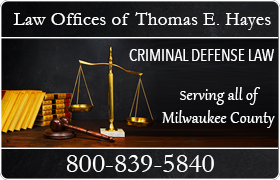Milwaukee Misdemeanor Lawyer, Wisconsin
Sponsored Law Firm
-
 x
x

Click For More Info:
-
Law Offices of Thomas E. Hayes
161 W Wisconsin Ave Suite 3032 Milwaukee, WI 53203» view mapMilwaukee County Criminal Defense Over 30 Years of Experience
Clients should be comfortable with their lawyer. I am the only one who "works" my cases. My work ethic is efficient result oriented.
800-839-5840
Julia Marie Zielinski
Misdemeanor, Felony, DUI-DWI, Criminal
Status: In Good Standing *Status is reviewed annually. For latest information visit here
FREE CONSULTATION
CONTACTAlex Flynn
Dispute Resolution, Child Custody, Misdemeanor, Criminal
Status: In Good Standing *Status is reviewed annually. For latest information visit here
Andrea Friedenauer Hoeschen
Real Estate, Lawsuit & Dispute, Employment, Misdemeanor
Status: In Good Standing *Status is reviewed annually. For latest information visit here Licensed: 28 Years
Catherine A. La Fleur
Landlord-Tenant, Immigration, Divorce & Family Law, Misdemeanor
Status: In Good Standing *Status is reviewed annually. For latest information visit here Licensed: 37 Years
Daniel Gordon Mitchell
Felony, Misdemeanor, DUI-DWI
Status: In Good Standing *Status is reviewed annually. For latest information visit here Licensed: 30 Years
David Kent Anderson
Criminal, DUI-DWI, Misdemeanor
Status: In Good Standing *Status is reviewed annually. For latest information visit here Licensed: 42 Years
Emily A Fey
Trusts, Estate, Misdemeanor
Status: In Good Standing *Status is reviewed annually. For latest information visit here
Eric P. Pitsch
Divorce & Family Law, Misdemeanor, DUI-DWI, Criminal, Accident & Injury
Status: In Good Standing *Status is reviewed annually. For latest information visit here
Gary R. George
Motor Vehicle, Pension & Benefits, Family Law, Misdemeanor
Status: In Good Standing *Status is reviewed annually. For latest information visit here Licensed: 46 Years
Joseph Francis Fischer
Traffic, Employee Rights, Misdemeanor, Felony
Status: In Good Standing *Status is reviewed annually. For latest information visit here Licensed: 29 Years

 Thomas Hayes Milwaukee, WI
Thomas Hayes Milwaukee, WI Contact UsRequest Consultation Now
Contact UsRequest Consultation Now Law OfficeLaw Offices of Thomas E. Hayes
Law OfficeLaw Offices of Thomas E. Hayes